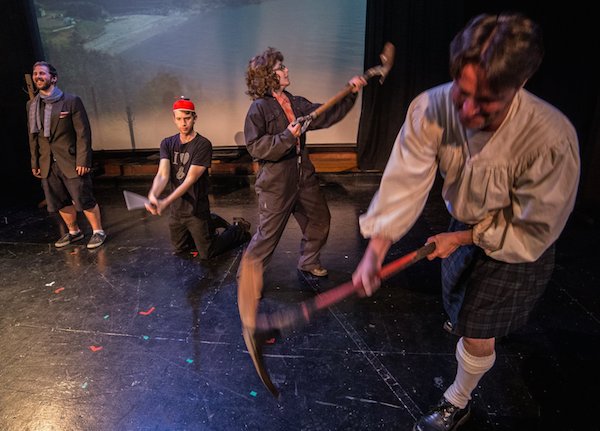
The True Meaning Of Cape Breton, Thompson’s latest play running Sunday evenings as part of the Highland Arts Theatre’s summer season, takes on, to great comedic effect, all of the usual clichés and flag-waving associated with our island’s self-regard.
The two act play is built around a set of parodies of Christmas classics, such as “It’s a Wonderful Life”, “A Christmas Carol”, and the original “Charlie Brown Christmas”. Besides giving the audience the pleasure of seeing something familiar being gently mocked, the device also serves a second purpose of commenting on how certain true-isms about Cape Breton (the music, the island’s beauty, the friendly people, etc.) have taken on an unexamined triteness.
Thompson’s riffs on both themes (Cape Breton and Christmas) are inventive and witty: the guardian angel from “Wonderful Life” becomes a sort of famous hockey player from Sydney’s failed American Hockey League franchise, Ryan (the main character in search of the true meaning of etc.) gets his wish to find out what it would have been like if he had never been born on Cape Breton and it’s not so bad (although it does lead to alliance with some damned dirty hunting enthusiasts), and of course characters tend to burst into the Snoopy dance (always a plus in my view). There were very comical swipes at doltish tourists, artsy theatre types, call centres, and even the play’s own audience.
I saw the opening night performance which I found a little rough around the edges. All of the cast were game and gave the material their all much to the delight of the audience, but there were issues among some of them with low volume and elocution. There were also problems with a unco-operative rolling flat, an early cue on a hilariously photo-shopped image of a beloved Sydney landmark that got a big laugh but upstaged the scene it preceded, and a looseness in some of the staging.
Danny MacNeil gave a fine performance as Ryan and some of his reactions to the absurdity of the situations Thompson’s script sent him through were golden. Duane Nardocchio was very funny as one half of the tourist couple and really shone as the AHL angel (perhaps the most rounded and genuinely sympathetic character in the show). Jonathan Lewis used his lankiness to great comedic effect as one of the actors in the play within a play and then again as an overly unfortunate homeless person.
Hilary Scott and Jenna Lahey, probably the two most experienced actors in the cast, gave the most assured performances. Scott also had great body language as one of the actors “warming up” like an electrified contortionist, almost unrecognizable as a loutish Ontario tourist, and in a feisty parody of her gentle character in the Highland Arts’ recent production of “A Christmas Carol” (allowing HAT to get double value from a single costume). Lahey (with the help of Diana MacKinnon Furlong’s costuming) was a treat as Ryan’s mother and smoothly navigated the stage behind a moving desk as another “Spirit of Cape Breton” working out of a call centre.
The play, directed by Wesley J. Colford, had a swift pace and hit all the comedic beats with precision but at times seemed to lack focus. The play opens with a smart joke about Cape Breton names but played in front of the proscenium curtain meant the cast had a lot of geography to cover making the joke play out for longer than necessary. Some scenes, like Alternate Ryan at his desk in a far corner at the back of the stage, meant characters were playing at each other across huge distances. Given the theatre savvy-ness of the cast and director I expect these would disappear in later performances.
Thompson’s script is tightly written, fast paced, and hilarious, and based on the opening night’s audience thunderous approval will only get funnier and more assured as its run continues.

